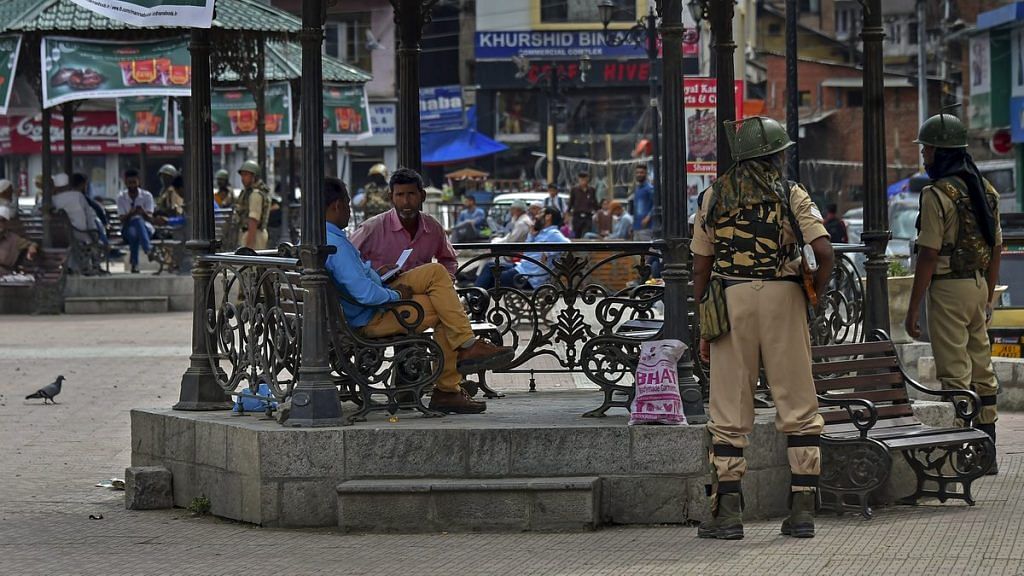Srinagar: Aijaz ul-Qayoom, who works in a state-run bank in Kashmir, doesn’t really care about all the talk of a possible India-Pakistan war triggered by the 14 February Pulwama attack and the ensuing bilateral face-off.
But mention the clutch of petitions that have challenged Article 35A in the Supreme Court, and his blood boils.
“We have been living in a war-like situation since the last 30 years… It has become a part of our life now. It does not bother us,” Aijaz told ThePrint.
“But despite all the problems, the militancy, etc, we got strength from Article 35A as we knew our rights were protected.”
Article 35A is a constitutional provision that allows the J&K assembly to define “permanent residents” of the state, who are then eligible to certain rights and privileges, including employment in the J&K government, acquisition of immovable land or property, scholarships and other such aid and welfare from the government.
Incorporated into the Constitution by a presidential order in 1954, the provision bars non-residents from acquiring property in Jammu & Kashmir, and locals consider it sacred to the agreement under which the state acceded to India in 1947. It also nullifies the inheritance rights of local women who marry outside the state, and the entire protest against Article 35A is centred on these two factors. The petitions challenging the provision are expected to be heard by the Supreme Court soon.
“[Under Article 35A] We [Kashmiris] will be preferred in jobs,” said Aijaz. “Our land will be ours. But tomorrow, if you decide to scrap it and allow outsiders to come here and take away our jobs, you think we will remain silent?”
The sentiment seems to resonate with Kashmiris across the spectrum — be it politicians of different stripes, scholars, government officials, businessmen or students.
‘A direct attack’
Talking to ThePrint, a senior Kashmiri official of the Jammu & Kashmir government said any move to tinker with Article 35A will create a law and order situation that “will be difficult to control”.
“We are currently only dealing with militancy,” he added. “But any fiddling with Article 35A will bring everybody out on the road, including those in the mainstream, as it directly attacks the right of every individual Kashmiri.”
How will the government control the situation then?” he said.
Sajad Gani Lone of the People’s Conference, an ally of the Bharatiya Janata Party (BJP), said Article 35A was a greater preoccupation for Kashmiris than a possible war. “The government should step in to allay the apprehensions that Kashmiris have, instead of further igniting the already volatile situation,” he added.
Lone said that, since 1989, when militancy was at its peak in Kashmir, the government had dealt with the Valley through military measures. This, he said, had resulted in “more dead bodies, more widows, more orphans”.
“Now, military measures would have to make way for structural measures, which is to reverse the constitutional erosions that have taken place,” he added.
“If you think of tinkering with 35A instead, it will result in further erosion and alienation. This will again feed into violence, which will be countered by more military measures.”
Also read: Kashmir on edge again as hearing on Article 35A in Supreme Court draws closer
Bipartisan appeal
The state of J&K has been without an elected government since June last year, when the BJP pulled out of its alliance with the state-based Peoples Democratic Party (PDP). Earlier this month, the state told the Supreme Court that only an elected government could present the state’s view on the petitions challenging Article 35A, and sought a deferment till after another administration is sworn in.
However, the assurance has done little to calm apprehensions. Amid reports last week that the Supreme Court would take up the anti-Article 35A petitions sometime this week, there was widespread panic and tension in the Valley.
Locals reportedly began stocking up fuel and food in the apprehension of chaos, while separatists announced a shutdown.
The two major players of local politics, the PDP and the National Conference (NC), have also spoken in one voice to defend Article 35A as well as Article 370, which grants special status to J&K and has also been challenged in the Supreme Court.
Speaking to ThePrint earlier this week, former chief minister Omar Abdullah of the NC said any “tinkering with Article 370 and 35A will be disastrous for the state”.
PDP chief and former CM Mehbooba Mufti said Monday that the “Centre should not play with fire”. Addressing a press conference in Srinagar, she added, “Don’t fiddle with Article 35A, else you will see what you have not seen since 1947. If it is attacked, then I don’t know which flag people of J&K will be forced to pick up instead of the Tricolour.”
‘A matter of Kashmiri identity & security’
According to Noor Ahmad Baba, a professor in the department of politics and governance at the Central University of Kashmir, said “this whole narrative that is being built looks part of a well-planned strategy to put people in the state on the defensive”.
“People in Kashmir are more sensitive to issues that involve Kashmiri identity and security,” he added. “Any talk of scrapping Article 35A will cut across the political spectrum and bring people out on the streets. It will be difficult to handle the situation then.”
Also read: Tinkering with Article 370 or 35A will be disastrous for Jammu and Kashmir: Omar Abdullah
